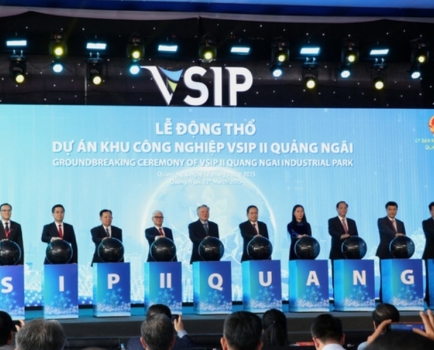Leveraging PPP for Large-Scale Transport Infrastructure Development
Tue, 06 Aug 2024 16:11:00 | Print | Email Share:
To mobilize capital for transport infrastructure development, the Vietnamese government advocates leveraging both domestic and foreign resources through various investment models, including Build-Operate-Transfer (BOT), Build-Transfer (BT), and Public-Private Partnerships (PPP). Emphasis is placed on PPP-based investments, particularly for new large-scale airports, seaports, and wharf areas.

According to the World Economic Forum's 2019 Global Competitiveness Report, Vietnam ranked 77th out of 141 economies in overall infrastructure quality. Specifically, the country ranked 66th in transport infrastructure and 87th in utility infrastructure.
However, Vietnam's transport infrastructure system is, in reality, still poor while technical standards remain low and outdated, asynchronized and weakly connected. The transnational road system is overloaded and degraded relative to the growing demand but expansion and upgrading investments are challenging due to insufficient funds. The North-South Railway lacks connections to economic zones, industrial parks, and seaports due to the absence of branch railways. The current state of the railway infrastructure is rated as extremely poor, with narrow gauges preventing high-speed mobility.
To mobilize capital for transport infrastructure development, the Vietnamese government advocates encouraging all domestic and foreign resources, from economic sectors, in various investment cooperation forms such as BOT, BT and PPP, with a focus on PPP-based investment in new large-scale airports, seaports, and wharf areas. The National Assembly enacted the Law on Public-Private Partnerships on June 19, 2020, effective January 1, 2021, to support and regulate private investment in infrastructure, focusing on transportation, electricity grids, and power plants. This move aimed to attract more private investment to reduce burdens on public debt and fiscal policy. Actually, the eradication of bottlenecks in infrastructure investment, especially in transport infrastructure, to promote economic growth cannot be delayed. This is the time for stronger engagement of the private sector.
However, to effectively implement the PPP investment method, we need five fundamental viewpoints to better figure out strategic goals, make decisions on selection of partners and projects, carry out institutional development and encourage the private sector to form responsible cooperation to manage sustainable development projects.
Defining objectives, strategies and capacities at all levels
Competent agencies that initiate an infrastructure project must ensure that other stakeholders, including end users, are fully consulted. Agencies responsible for privately operated infrastructure projects must be able to manage relevant commercial processes and work on an equal footing with private sector partners.
The objectives and strategies of the private sector in infrastructure must be clearly understood, and the objectives shared, at all levels of government and in all relevant parts of public administration.
Making decisions on PPP project selection
The selection of a PPP project must be based on a cost-benefit analysis, taking into account all alternative delivery methods, the full infrastructure delivery system, and the expected financial and nonfinancial costs and benefits over the life of the project. No infrastructure project - regardless of the degree of private participation - should proceed without an assessment of the extent to which costs can be recovered by end users. In the event of a shortfall, it should be clearly identified what other sources of finance can be mobilized.
The risk analysis into private and public parties will be determined primarily by the chosen private sector participation model, including the allocation of responsibilities. The choice of a particular model and its associated risk allocation should be assessed for the sake of public interests.
Financial discipline and transparency must be ensured, with the potential public financial impact of responsibility sharing for infrastructure with the private sector being foreseen.
Strengthening the institutional environment
An appropriate institutional environment for infrastructure investment, including high standards of public and corporate governance, transparency and rule of law, including the protection of property rights and contracts, is necessary to engage private sector participation.
Public authorities must take effective measures to ensure the integrity and accountability of the public and private sectors and establish appropriate procedures to ensure integrity in cooperation.
Private sector participation in infrastructure development is significantly enhanced by fostering a competitive environment and eliminating unnecessary barriers in competition law enforcement.
Efforts should focus on building institutions to facilitate access to capital markets and leveraging state-owned land resources to support large-scale projects, thereby encouraging active private sector involvement. In particular, urban planning should incorporate the multi-center smart urban model, aligned with Transit-Oriented Development (TOD) principles. This approach prioritizes the integration of transportation and land use, offering many advantages for densely populated cities with limited space, such as Ho Chi Minh City and Hanoi. However, these modern models demand substantial capital and advanced technology. Therefore, it is crucial to develop macroeconomic policies that address restrictions on resource access and facilitate the movement of domestic and international capital.
Conducting public-private partnership
To optimize private sector participation, authorities must clearly communicate the objectives of their infrastructure policies and must provide a consultation mechanism for public and private partners on these objectives and individual projects.
There must be a mechanism for the provision of full project-related information between authorities and private partners, including the pre-existing state of infrastructure, performance standards and non-compliance penalties. The principle of special monitoring and supervision must be respected.
The award of infrastructure contracts or priorities must be carefully prepared to ensure procedural fairness, non-discrimination and transparency. The formal agreement between authorities and private stakeholders must specify verifiable infrastructure services that will be provided to the public on an output or performance-based basis according to technical specifications. This agreement should define responsibilities and allocate risks in the event of unforeseen events.
The provision of infrastructure services should be delegated to competent, resourced professional bodies that are not dominated by any party to the infrastructure contract.
A dispute resolution mechanism should be in place for any disputes that arise during the life of the project and disagreements should be resolved in a timely and equitable manner.
Promoting responsible business practices
Private stakeholders in infrastructure projects must adhere to agreed principles and standards of environmentally and socially responsible business practices; and have good faith and commitment to performing contracts and their terms.
Private stakeholders, their subcontractors and their representatives must not engage in bribery or other improper conduct to obtain contracts, gain control of assets or gain favors, nor engage in such conduct in the course of their infrastructure operations. In addition, they must contribute to a public consultation and communication strategy, including consumers, affected communities and stakeholders, to achieve joint acceptance and understanding of the objectives of the parties involved.
The private sector involved in providing essential services to the community must pay attention to consequences of its actions on the community and cooperate with competent authorities to avoid and mitigate consequences that are unacceptable to society.
With improved resource management through the integration of land use planning and infrastructure development, Vietnam will see the development of world-class highways, bridges, ports, and underground transportation systems. The private sector is expected to play a significant role in these advancements, contributing substantially to the country's infrastructure growth.
Dr. Doan Duy Khuong & Dr. Nguyen Duc Tho (University of Technology and Management)
By: Vietnam Business Forum
Source: https://vccinews.com/news/58189/leveraging-ppp-for-large-scale-transport-infrastructure-development.html
---------------------------------------------
Same category News :













